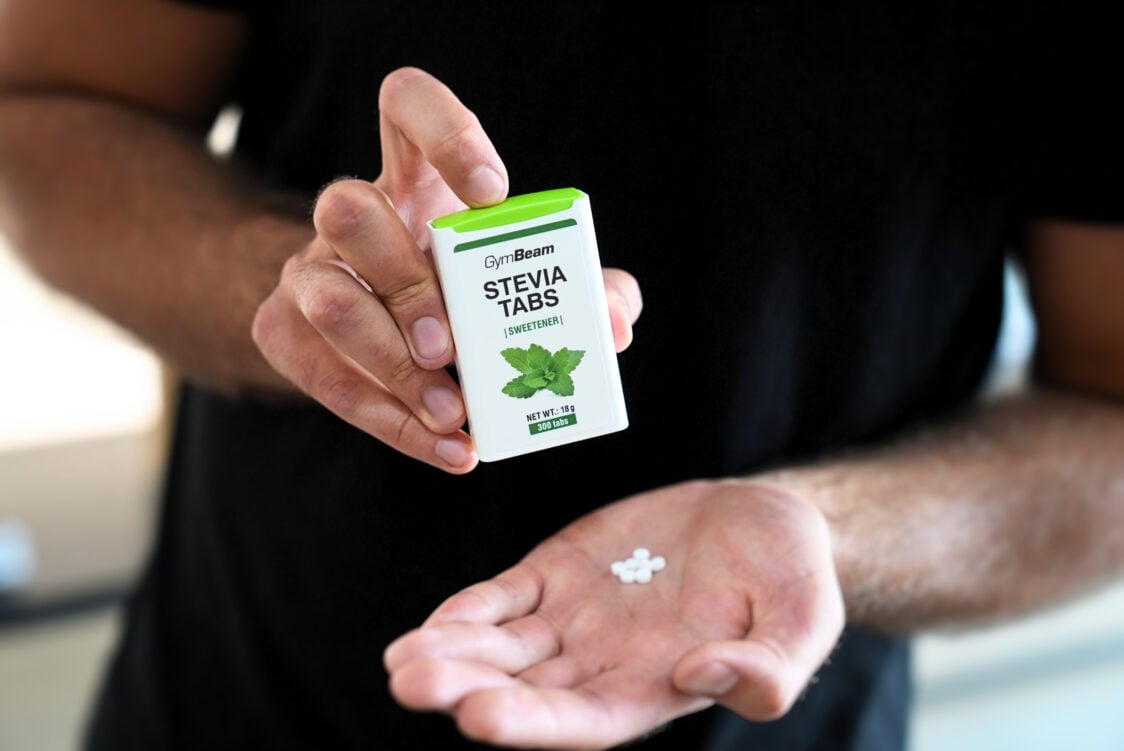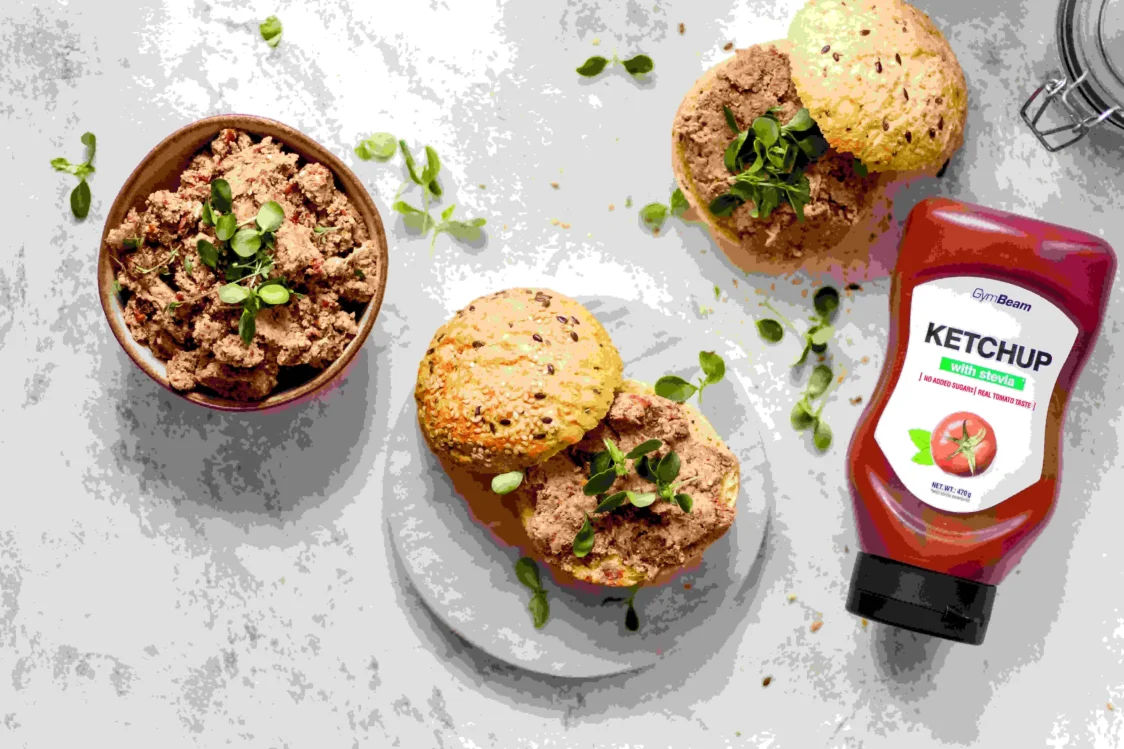Table of Contents
Stevia has earned a reputation as a guilt-free sweetener, allowing us to sweeten our lives without increasing our calorie intake. This makes it popular among those embracing a healthy lifestyle or undergoing weight loss. However, research also points to its other health benefits, which are not as widely known. How else can stevia be beneficial for health?
In the article, you’ll learn about the influence of stevia on the following areas:
What is stevia?
Under the name stevia, approximately 150 plants originating from South America are known for their sweetening properties. Interestingly, they were also used as a natural contraceptive, although this effect has not been scientifically confirmed. The most well-known of these plants is Stevia rebaudiana, as it is the sweetest. Various powders, drops, or other forms of this natural sweetener are now produced from it. This plant contains steviol glycosides, giving it its characteristic sweet taste. These include, for example, rebaudiosides and the sweetest of all, steviosides. [7,8,9]
What is in stevia sweetener?
The sweetener is not made from, for example, dried stevia leaves. In fact, it contains an extract from stevia in the form of steviol glycosides. This extract is approximately 200-300 times sweeter than sucrose (regular white sugar). Therefore, significantly less stevia is needed compared to sugar when sweetening something. However, stevia sweeteners are also known for their specific taste, which may not suit everyone. Often, to achieve the most authentic sweet taste, they are combined with other sweeteners, such as erythritol. [7,8,9]

How many calories does stevia have?
Stevia is considered a zero-calorie sweetener. While it does contain some energy, it is so minimal that it is negligible for our bodies. It is hardly absorbed into the bloodstream from the digestive tract but is taken up by intestinal bacteria in the colon. These bacteria produce substances with a certain caloric content that can be absorbed in minimal amounts. However, the energy intake is so minimal that stevia is generally classified as a non-nutritive sweetener. [9]
You might be interested in these products:
What are the health benefits of stevia?
Although stevia is mainly known just as a natural, zero-calorie sweetener, it also boasts many other benefits. Many of them require further research for clarification, but today we can say that stevia has promising effects on health, making it beneficial not only for weight loss.
1. It Aids in Weight Loss and Weight Management
Using stevia instead of sugar can help reduce your overall energy intake. Successful weight loss occurs when there is a calorie deficit, meaning that energy intake is lower than expenditure.
Sugar is relatively high in calories (1 g of sugar has 4 kcal), and by partially replacing it with stevia, it can make weight loss more manageable.
What can be achieved by replacing sugar with stevia?
Let’s take an example of Lucy, who each day typically consumes 500 ml of sugary drinks sweetened with sugar, at least two sweetened coffees, and a piece of cake. How much sugar and calories could she avoid by replacing the regular versions with those sweetened with stevia?
| Coca Cola (500 ml) | 55 g sugar / 220 kcal | 0 kcal |
| Morning Coffee | 5 g sugar / 20 kcal | 0 kcal |
| Afternoon Coffee | 5 g sugar / 20 kcal | 0 kcal |
| Cake | 10 g sugar / 40 kcal | 0 kcal |
Since stevia is a zero-calorie sweetener, basically any amount in food increases your caloric intake by 0 kcal. On the other hand, sugar definitely has calories. As seen in the table, consuming around 70 g of sugar daily is quite easy. This amount corresponds to 300 kcal, which is the energy content in a smaller meal, such as a baked toast with two slices of 45% edam cheese and ham. By making this shift, theoretically, you could burn 1 kg of fat with minimal effort in 25 days (1 kg of body fat is approximately 7700 kcal).
Therefore, if you have a sweet tooth and your diet is rich in sugar, you can use stevia to help limit your sugar intake. You’ll still enjoy the sweet taste without taking in extra calories. Stevia is beneficial not only during a diet but also when you want to control your body weight or simply improve your diet.
If you’re interested in additional tips on reducing sugar in your diet, you can read our article 8 Tips on How to Limit Sugar and Eat Less Sweet.

2. It Influences Blood Sugar Levels
Studies indicate that stevia may have an effect on insulin release and function. This hormone aids in moving glucose (sugar) from the blood into cells, thereby reducing blood sugar levels (glycemia). Thanks to the action of steviol glycosides on insulin, stevia can help control blood sugar levels.
This effect has been observed in cases where initial glycemia was elevated. Therefore, individuals with type 2 diabetes, whose bodies struggle to independently regulate blood sugar levels, could benefit from stevia. Due to its properties such as zero calories and a zero glycemic index, stevia is an ideal sweetener for diabetics.
Fluctuations in glycemia can also affect healthy individuals, manifesting as feelings of low energy or cravings for sweets. Those who encounter these issues may really appreciate more stable blood sugar levels. [3,5]
For more tips on combating sweet cravings, check out suggestions in the article 15 Steps to Get Rid of Sweet Cravings.
3. It Has an Impact on Blood Pressure
Research indicates that steviol glycosides also affect blood pressure levels. They help relax and widen blood vessels, leading to a reduction in pressure.
In a study involving 106 individuals with high blood pressure, the impact of stevia on cardiovascular health was observed. Participants took 750 mg of steviol glycosides daily or an equivalent amount of a placebo. After 12 weeks, it was found that blood pressure significantly decreased in those taking steviol glycosides compared to the placebo group. [2,3]
This is certainly an intriguing effect of steviol glycosides, as high blood pressure is a risk factor for atherosclerosis. Also known as the hardening of the arteries, this health issue increases the risk of a heart attack or stroke. Stevia could thus be a helpful ally in caring for a healthy heart. [3,5]
Discover our bestsellers:
4. It Influences Dental Health
Stevia is non-cariogenic, meaning it does not contribute to the formation of tooth decay. Substituting sugar with stevia can therefore benefit your teeth. Sugar is the culprit when it comes to dental health risks. From sugar. bacteria in the oral cavity form acids and damage tooth enamel. With stevia, nothing like that happens in the mouth, and it does not affect tooth structure whatsoever. [3]
Studies also mention the antibacterial effects of stevia. It may thus be helping the process of elimination of harmful bacteria in the oral cavity.

5. It Has Antioxidant Effects
According to available research, stevia also boasts antioxidant properties. It can aid in protection against free radicals generated by oxidative stress.
The antioxidant effects are likely attributed to phenolic and other beneficial compounds present in stevia. By combating oxidative stress, they can lend a helping hand in preventing various health issues, such as cancer. Oxidative stress also accelerates cell ageing, making these substances useful in the context of healthy ageing or anti-ageing procedures. [3]
If you want to learn more about what else can help you age healthily, you can read the article Anti-aging and Healthy Aging: How to take care of your body and maintain health and a youthful appearance??
6. It Influences Digestion
Studies also highlight the impact of stevia on digestive issues, particularly demonstrating its potential usefulness in cases of diarrhea. The exact mechanism is not yet fully understood, but it appears that steviol glycosides interact with the intestinal wall, alleviating excessive water secretion into the intestine, a characteristic feature of this digestive problem.
Additionally, steviol glycosides seem to have antibacterial properties as well, which may help eliminate pathogenic bacteria in the intestines. [5]

7. It Affects the Intestinal Microbiome
The results of studies examining the influence of stevia on the intestinal microbiome are not uniform. Scientists discuss both its positive and negative effects. On one hand, stevia may behave as a probiotic, serving as food for beneficial gut bacteria. These bacteria can then grow, multiply, and limit the spread of undesirable bacteria associated with various health problems.
On the other hand, research also mentions that the consumption of stevia may worsen the composition of the intestinal microbiota. However, this effect was mostly observed in animals. Nevertheless, it is advisable to use stevia in moderation and according to recommendations, which we will discuss in a second. [4,5]
8. Other Potential Health Benefits of Stevia
- Research also mentions the effect of stevia on cancer cells. Steviol glycosides in experiments helped slow their proliferation, specifically in cases such as colorectal cancer. [7]
- There is also a positive effect on idiopathic inflammatory bowel diseases, such as Crohn’s disease and ulcerative colitis. These are chronic inflammatory conditions that lead to damage to the intestinal wall. Steviol glycosides, likely due to their promising anti-inflammatory effects, could help alleviate symptoms of these diseases. [3]

Does stevia have any adverse effects?
Stevia is known for not being associated with basically any adverse effects. However, this primarily refers to the extract from steviol glycosides found in commonly available sweeteners on the market. This form of stevia is the most researched.
The use of the whole plant, for example, in ground form or as an extract, could potentially have side effects. Further research is needed to clarify the impact of these forms of stevia. For the average person, it is most useful to know the effects of steviol glycosides themselves. In practice, you would come into contact with the actual plant only if you would be cultivating it at home. While this is realistic, the sweetening effects and other benefits are mainly derived from the extract of steviol glycosides. [1,8]
Is stevia safe?
Stevia was banned for a certain period, and someone might assume that it would be better to avoid it. However, we now have more scientific studies that examine the impact of stevia, especially steviol glycosides, on health. Over time, knowledge has progressed, no significant negative effects have been observed in studies, and based on that, stevia sweetener in the form of steviol glycosides is considered safe. Important professional institutions such as the World Health Organization (WHO) and the European Food Safety Authority (EFSA) hold this stance. [5]
In the countries of the European Union, steviol glycosides can be found under the designation E960. However, there is no need to fear it as some dangerous food additive. On the contrary, this code indicates that steviol glycosides have been sufficiently studied and are safe for use in food.
Is stevia safe during pregnancy?
Stevia is considered safe during pregnancy. However, pregnant women should consume stevia in moderation, following the recommendations for their daily intake. [5]

How much stevia can you consume daily?
The acceptable daily intake (ADI) of steviol glycosides is set at 4 mg/kg of body weight, which amounts to 280 mg for an average 70 kg person. This quantity can be consumed daily without any health risks. The average estimated daily intake of stevia (EDI) is far below the ADI limit. Moreover, studies suggest that even an intake of 1.5 g daily does not have adverse effects with long-term use. [6,7]
Overview of stevia properties:
| EU Designation | E960 |
| Sweetness | 200 – 300 times sweeter than sugar |
| ADI* | 4 mg / kg TH |
| EDI** | 0,1 – 1 mg / kg TH |
Acceptable Daily Intake
Estimated Daily Intake
Where can you find stevia?
Stevia is a relatively widespread sweetener, commonly found in ready-to-eat foods. It can be found in chocolates, candies, cookies, or even chewing gums. It is used to sweeten yoghurts, cereal products, various sauces, ketchups, and is also used in protein bars or to sweeten whey protein. Additionally, it is often found in the composition of sugar-free dietary drinks.

Where can stevia be used?
When choosing which form to buy stevia sweetener, many options are available, such as drops, tablets, or powder. Stevia is also combined with other sweeteners to mask the specific taste that might feel unpleasant to some.
You can use stevia in baking, cooking or just to sweeten drinks. What can you sweeten with stevia?
- Cakes, pastries, muffins, cookies, and other sweet treats
- Batter for pancakes or fritters
- Oat, rice, or other cereal porridge
- Sweet sauces or marinades for meat
- Coffee or tea
- Homemade lemonades
What should you remember?
Stevia is a natural sweetener that has earned a good reputation, mainly due to its zero-calorie content. It boasts an intense sweet taste without increasing calorie intake, making it ideal for weight loss. Furthermore, studies show its additional beneficial effects on health, such as a positive impact on blood pressure, blood sugar levels, or dental health. Stevia can be an interesting addition to your diet when looking to reduce sugar, manage weight, or simply take care of your health. It also serves as a great sugar substitute for diabetics.
Will you give stevia a try? If this article piqued your interest, don’t keep it to yourself. Share it with your friends and family.
[1] ANTON, S.D. et al. Effects of stevia, aspartame, and sucrose on food intake, satiety, and postprandial glucose and insulin levels. – https://www.ncbi.nlm.nih.gov/pmc/articles/PMC2900484/
[2] CHAN, P. et al. A double-blind placebo-controlled study of the effectiveness and tolerability of oral stevioside in human hypertension. – https://www.ncbi.nlm.nih.gov/pmc/articles/PMC2014988/
[3] JAHANGIR CHUGHTAI, M.F. et al. Nutritional and therapeutic perspectives of Stevia rebaudiana as emerging sweetener; a way forward for sweetener industry. – https://www.tandfonline.com/doi/full/10.1080/19476337.2020.1721562
[4] KASTI, A.N. et al. The Effects of Stevia Consumption on Gut Bacteria: Friend or Foe? – https://www.ncbi.nlm.nih.gov/pmc/articles/PMC9028423/
[5] ORELLANA-PAUCAR, A.M. Steviol Glycosides from Stevia rebaudiana: An Updated Overview of Their Sweetening Activity, Pharmacological Properties, and Safety Aspects. – https://www.ncbi.nlm.nih.gov/pmc/articles/PMC9920402/
[6] PATEL, K. Stevia Research Analysis. – https://examine.com/foods/stevia/
[7] PETELIUK, V. et al. Natural sweetener Stevia rebaudiana: Functionalities, health benefits and potential risks. – https://www.ncbi.nlm.nih.gov/pmc/articles/PMC8600158/
[8] SAMUEL, P. et al. Stevia Leaf to Stevia Sweetener: Exploring Its Science, Benefits, and Future Potential. – https://www.sciencedirect.com/science/article/pii/S0022316622163650
[9] Research Breakdown on Stevia - Examine. – https://examine.com/foods/stevia/research/


Add a comment